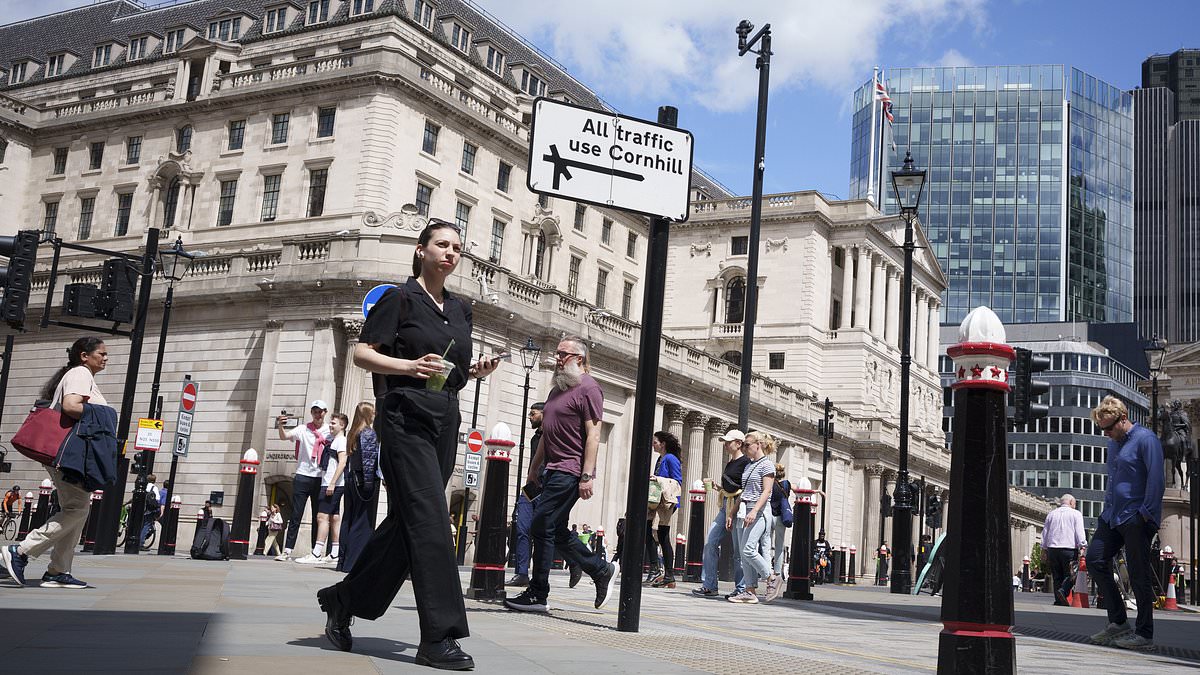Britain’s rich are getting poorer. The UK suffered the second biggest decline in average household wealth of any major economy last year, according to a new report says, because higher income households lost out.
Average real-term household wealth, so adjusted for inflation, fell by 3.6 per cent across Britain last year, a global analysis by UBS suggests.
But this was skewed by the rich falling behind and reducing the average, while households further down the scale became better off.
Paul Donovan, chief economist at UBS Global Wealth Management, told This is Money: ‘Most people in Britain enjoyed a significant increase in their real wealth levels in 2024 – median wealth grew over 5 per cent in real terms and wealth distribution became more equal.
‘However a number of higher income households experienced slower wealth growth, and when adjusted for inflation the experience of this group pushed the average lower.’
Click here to resize this module
According to Michel Frey, head of UK high net worth business in UBS’ wealth management arm, average real-term household wealth in Britain slipped as cost of living pressures and higher interest rates outpaced most financial market or property price growth.
This combination of forces, Frey told City AM, hampered some people’s ability to retain or build wealth, particularly among high net worth individuals.
While real-term household wealth across Britain fell 3.6 per cent in 2024, median wealth rose by just over 5 per cent.
Donovan said: ‘Higher income households tend to hold more equity than most UK households, and the underperformance of the UK equity market compared to European and US equities will have contributed to that.
‘Countries where wealth inequality increased are more likely to have experienced higher average real wealth growth than the UK.’
Amid concerns over a growing exodus of wealthy individuals from Britain, Rachel Rachel Reeves is reportedly mulling a softening of non-dom inheritance tax rules.
Aside from Britain, the likes of Turkey, Mexico, France, the UAE, mainland China and Russia also saw average real-term household wealth fall in 2024, according to UBS.
In Turkey, where inflation topped 75 per cent at one point in 2024, average real-term household wealth fell 14 per cent last year, the findings showed.
UBS said: ‘Measured in USD, in real terms over half of the 56 markets in the sample not only didn’t take part in the world’s growth last year, but saw their average wealth per adult decline.’
Related ArticlesHOW THIS IS MONEY CAN HELPThe US mints 379,000 more dollar millionaires
Global wealth grew 4.6 per cent in 2024 after a 4.2 per cent increase in 2023, continuing a consistent upward trend, UBS said.
Private individuals’ net worth rose 4.6 per cent worldwide, and by over 11 per cent in the Americas, driven by a stable US dollar and upbeat financial markets, the UBS report found.
Elsewhere in the research, UBS said more than 379,000 people became new US dollar millionaires in the US last year, equating to more than 1,000 per day.
Mainland China saw over 386 new millionaires every day, equating to 141,000 in the course of 2024, equivalent to an increase of 2.3 per cent on the previous year.
Switzerland continued to top the list for average wealth per adult on an individual market level, followed by the US, Hong Kong and Luxembourg.
Click here to resize this module
This week, data from the Office for National Statistics showed that inflation across Britain was 3.4 per cent in May, down from 3.5 per cent in June.
ONS acting chief economist Richard Heys said on Wednesday: ‘A variety of counteracting price movements meant inflation was little changed in May.
‘Air fares fell this month, compared with a large rise at the same time last year, as the timing of Easter and school holidays affected pricing. Meanwhile, motor fuel costs also saw a drop.’
He added: ‘These were partially offset by rising food prices, particularly items such as chocolates and meat products.
‘The cost of furniture and household goods, including fridge freezers and vacuum cleaners, also increased.’
Britain’s economy slowed sharply in April, reflecting shockwaves from Trump’s announcement of wide-ranging tariffs and a one-off hit from the end of a tax break on property sales.
Gross domestic output shrank by a larger-than-expected 0.3 per cent in April from March, representing the biggest monthly drop since October 2023 and following 0.2 per cent growth in March.
The CBI downgraded its forecast for economic growth forecast for Britain this year from 1.6 per cent to 1.2 per cent, and from 1.5 per cent to 1 per cent for next year.
How to get richer? Listen to the This is Money podcast
Want to know the most important things you need to know about money each week and get tips on how to live a richer life?
Listen to the weekly This is Money podcast.
Press play to listen to the latest episode on the player above, or listen (and please subscribe and review us if you like the podcast) at Apple Podcasts and Spotify or visit our This is Money Podcast page.
DIY INVESTING PLATFORMS

AJ Bell

AJ Bell
Easy investing and ready-made portfolios

Hargreaves Lansdown

Hargreaves Lansdown
Free fund dealing and investment ideas

interactive investor

interactive investor
Flat-fee investing from £4.99 per month

InvestEngine

InvestEngine
Account and trading fee-free ETF investing
![]()
Trading 212
![]()
Trading 212
Free share dealing and no account fee
Compare the best investing account for you
